Related Research Articles
In most common law jurisdictions, the attorney general or attorney-general is the main legal advisor to the government. In some jurisdictions, attorneys general also have executive responsibility for law enforcement, prosecutions or even responsibility for legal affairs generally. In practice, the extent to which the attorney general personally provides legal advice to the government varies between jurisdictions, and even between individual office-holders within the same jurisdiction, often depending on the level and nature of the office-holder's prior legal experience.
The Director of Public Prosecutions (DPP) is the office or official charged with the prosecution of criminal offences in several criminal jurisdictions around the world. The title is used mainly in jurisdictions that are or have been members of the Commonwealth of Nations.

The Crown Prosecution Service (CPS) is the principal public agency for conducting criminal prosecutions in England and Wales. It is headed by the Director of Public Prosecutions.

In the United States, a district attorney (DA), county attorney, county prosecutor, state's attorney, prosecuting attorney, commonwealth's attorney, state attorney or solicitor is the chief prosecutor or chief law enforcement officer representing a U.S. state in a local government area, typically a county or a group of counties. The exact and scope of the office varies by state. Generally, the prosecutor represents the people of the jurisdiction. With the exception of three states, district attorneys are elected, unlike similar roles in other common law jurisdictions.

A prosecutor is a legal representative of the prosecution in states with either the common law adversarial system or the civil law inquisitorial system. The prosecution is the legal party responsible for presenting the case in a criminal trial against the defendant, an individual accused of breaking the law. Typically, the prosecutor represents the state or the government in the case brought against the accused person.
The Law Officers are the senior legal advisors to His Majesty's Government of the United Kingdom and devolved governments of Northern Ireland, Scotland and Wales. They are variously referred to as the Attorney General, Solicitor General, Lord Advocate, or Advocate General depending on seniority and geography - though other terms are also in use, such as the Counsel General for Wales. Law Officers in these roles are distinguished by being political appointees, while also being bound by the duties of independence, justice and confidentiality among the other typical professional commitments of lawyers. These roles do not have any direct oversight of prosecutions nor do they directly lead or influence criminal investigations. This is a distinguishing factor between Law Officers and the State Attorneys General of the United States or US Attorney General.

The European Public Prosecutor's Office (EPPO) is an independent body of the European Union (EU) with juridical personality, established under the Treaty of Lisbon between 23 of the 27 states of the EU following the method of enhanced cooperation. The EPPO was established as a response to the need for a prosecutorial body to combat crimes affecting the financial interests of the European Union (EU). The idea of establishing the EPPO gained momentum with a legislative proposal put forth by the European Commission in 2013. After lengthy negotiations and discussions within the European Council, the European Parliament and Member States, Regulation (EU) 2017/1939 was adopted on October 12, 2017, formalizing the creation of the EPPO. The EPPO Regulation is the EPPO's legal basis, as it outlines the objectives, structure, jurisdiction, and operational procedures. Directive (EU) 2017/1371, also known as the PIF Directive, specifies the criminal offenses affecting the EU's financial interest falling under the EPPO's jurisdiction. The EPPO's primary mandate is to investigate and prosecute offenses such as fraud, corruption, and money laundering that harm the financial interests of the EU, as defined by the PIF Directive. The EPPO represents a significant step towards a more integrated and effective approach to combating transnational crimes within the EU, fostering collaboration and coordination among member states to protect the Union's financial resources. As an independent EU body, the EPPO plays a crucial role in ensuring the rule of law and safeguarding the integrity of the EU's financial system. The EPPO is based in Kirchberg, Luxembourg City alongside the Court of Justice of the European Union (CJEU) and the European Court of Auditors (ECA).

Under the Constitution of Finland, everyone is entitled to have their case heard by a court or an authority appropriately and without undue delay. This is achieved through the judicial system of Finland.

The Judiciary of Russia interprets and applies the law of Russia. It is defined under the Constitution and law with a hierarchical structure with the Constitutional Court and Supreme Court at the apex. The district courts are the primary criminal trial courts, and the regional courts are the primary appellate courts. The judiciary is governed by the All-Russian Congress of Judges and its Council of Judges, and its management is aided by the Judicial Department of the Supreme Court, the Judicial Qualification Collegia, and the Ministry of Justice, and the various courts' chairpersons. And although there are many officers of the court, including jurors, the Prosecutor General remains the most powerful component of the Russian judicial system.
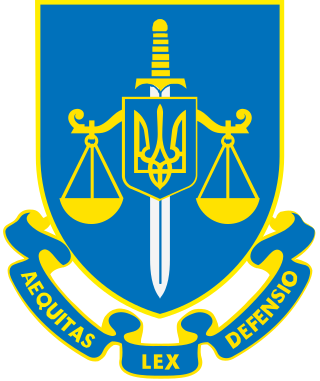
The prosecutor general of Ukraine heads the system of official prosecution in courts known as the Office of the Prosecutor General. The prosecutor general is appointed and dismissed by the president with consent of the Verkhovna Rada. The prosecutor serves a term of office of six years and may be forced to resign by a vote of no confidence in parliament. The current prosecutor general, since 27 July 2022, is Andriy Kostin.

The Prosecutor General of Russia heads the system of official prosecution in courts and heads the Office of the Prosecutor General of the Russian Federation. The Prosecutor General remains one of the most powerful component of the Russian judicial system.
Parliamentary Ombudsman is the name of the principal ombudsman institutions in Finland, Iceland, Denmark, Norway, and Sweden. In each case, the terms refer both to the office of the parliamentary ombudsman and to an individual ombudsman.
The Attorney General is the top prosecutorial official in Poland. The Office of the Public Prosecutor General's office has authority over the National Public Prosecutor, public prosecutors of universal prosecutorial bodies, regional prosecutorial bodies and various specific prosecutorial commissions. Apart from a brief period between 2010 and 2016, the position of Public Prosecutor General has been held concurrently by the Minister of Justice. Adam Bodnar is the current Public Prosecutor General of Poland.

The judicial system of Sweden consists of the law of Sweden and a number of government agencies tasked with upholding security and rule of law within the country. The activities of these agencies include police and law enforcement, prosecution, courts, and prisons and other correctional services.
The Prosecutor-General of Sweden is the department head for the Swedish Prosecution Authority responsible for the daily operations, the highest-ranked prosecutor in the country, and the only public prosecutor in the Supreme Court. The Office of the Prosecutor-General is responsible for legal development, the agency's operations in the Supreme Court, and administrative tasks. The Legal Department of the Prosecutor-General has an overall responsibility for the operations in the Supreme Court and key international issues. The office was established in 1948, when the Chancellor of Justice's task as chief prosecutor was transferred to the Prosecutor-General.
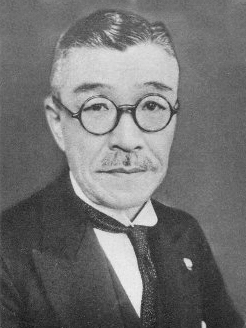
Suehiko Shiono was a Japanese lawyer, politician and cabinet minister noted for his prosecution of high-profile cases of political crimes and thought crimes under the Peace Preservation Laws of the 1930s Empire of Japan.

The General's Prosecutor Office of the Republic of Azerbaijan is an agency responsible for managing the criminal investigation and public prosecution in the Republic of Azerbaijan. Although the Azerbaijan constitution nominally guarantees judicial independence, the executive firmly controls prosecutors and judges. Judges and prosecutors collaborate in Azerbaijan to repress political opponents.
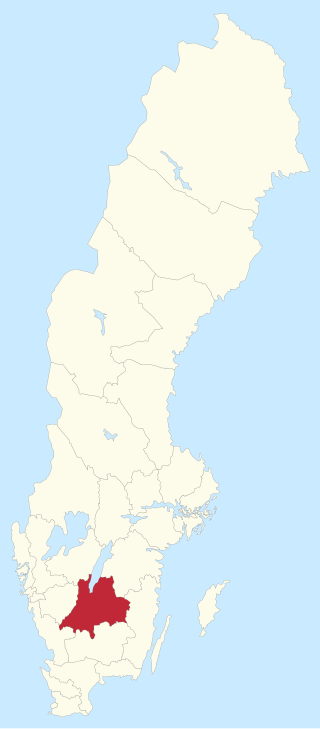
Jönköping County is one of the 29 multi-member constituencies of the Riksdag, the national legislature of Sweden. The constituency was established in 1970 when the Riksdag changed from a bicameral legislature to a unicameral legislature. It is conterminous with the county of Jönköping. The constituency currently elects 11 of the 349 members of the Riksdag using the open party-list proportional representation electoral system. At the 2022 general election it had 271,666 registered electors.
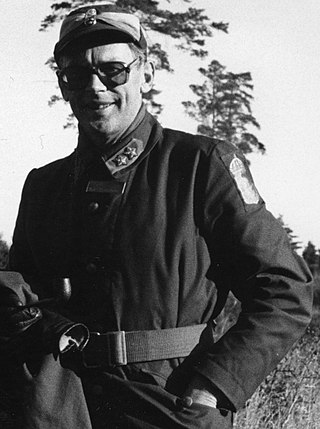
Lieutenant General Nils Gustaf Axel Welin was a senior Swedish Army officer. Welin served as head of the Swedish National Defence College (1984–1987), as Force Commander of the United Nations Disengagement Observer Force (UNDOF) (1986–1988) and as Commanding General of the Southern Military District (1988–1992).
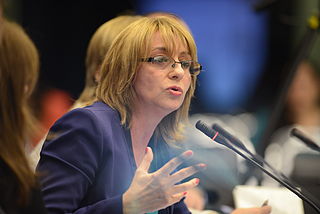
Alejandra Magdalena Gils Carbó is an Argentine jurist who served as the country's Attorney General from 29 August 2012 to 31 December 2017, during the administrations of Cristina Fernández de Kirchner and Mauricio Macri.
References
- ↑ CV Katarina Johansson Welin, Swedish Prosecution Authority (in Swedish).
- ↑ Regeringen utser Katarina Johansson Welin till ny riksåklagare, Government Offices of Sweden (in Swedish).